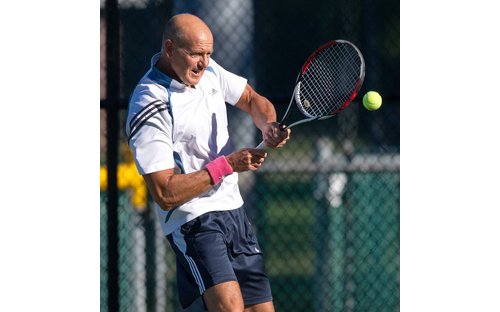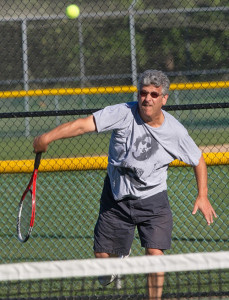His return to tourney a real talker

BOB WALL MEMORIAL TOURNAMENT
This sort of behavior on a public street would draw strange, worried looks, but on a tennis court, no one thinks twice about it. Tennis players talk to themselves.
Both players had their moments, moments when they could be heard talking to themselves. In anger or disgust, they chastised themselves for things such as hitting the ball to the wrong spot, not positioning themselves correctly, burying a serve into the net. Thus, the self-directed chatter.
“There’s no one [else] to talk to,” Richard Chizever explained. “In doubles you can talk to your partner.”
In the end, it was the player who did a little less talking, John Czartosieski, who walked off the court on Sunday morning as the new men’s 50-plus singles champion of the Bob Wall Memorial Tennis Tournament.
Czartosieski, the fourth seed, dethroned the defending champion and No. 2 seed, Chizever, 7-5, 7-5, in an entertaining, if flawed, contest that matched the beautiful weather it was played in at Robert W. Tasker Memorial Park in Peconic.
Czartosieski, 51, said this year marks the first time he has played in the tournament in about 15 years because of availability issues and three anterior cruciate ligament reconstructions in his right knee in the last 11 years. But Czartosieski’s right knee looked good, as did he. In fine physical condition, Czartosieski appears younger than his years. Following the 1-hour, 49-minute match and before the Riverhead man was presented with the championship plaque, he was jokingly asked for proof of his age.
Chizever, 57, of Aquebogue may have wondered himself how old his opponent is, but Chizever put away 23 winners and did well to make Czartosieski work hard for his points.

The match was a back-and-forth affair. With the exception of the final three games of the first set that Czartosieski won, neither player strung together more than two games in a row. The competitiveness of the match was reflected in the total points count, 86-80, in Czartosieski’s favor.
Neither player expressed pleasure with how he played, though.
“It’s a shame that we couldn’t have both played better,” Chizever said. “We made a lot of mistakes, both of us, but it was a lot of fun.”
Czartosieski wasn’t happy about committing 12 double faults (against 19 service aces). While Chizever was more steadier with his serve, double faulting only twice and putting in 74.4 percent of his first serves to Czartosieski’s 63.5 percent, Chizever said he didn’t move his feet enough. That might have contributed to his 16 unforced errors. Czartosieski was less accommodating in that area, surrendering only 5 unforced errors.
“I’m trying to get my game back to where I’m used to playing,” Czartosieski said. “I’m still not there. You saw all the double faults. You saw [me] missing easy groundstrokes.”
“I’m used to my serve carrying me,” he added. “I need to hit the practice courts. I need to take a bucket of balls out there, and I need to practice my serve because when my serve is on, people have a difficult time with it.”
Chizever was seeking his third men’s 50-plus singles title in the final, which had been postponed a week because of rain. He has a 0-3 career record against Czartosieski. That includes a three-set loss to him earlier this summer in the first round in the men’s singles competition of the tournament, which is sponsored by Times/Review Newsgroup. Czartosieski reached the semifinals of that bracket before falling to the eventual champion, Chris Ujkic.
While spectators seemed to enjoy watching Sunday’s match, the experience may not have been as gratifying to the players.
“I was very frustrated,” said Czartosieski, who coaches both the Westhampton Beach High School boys and girls tennis teams. “I felt like I couldn’t get any offense going, not the way I’m used to. I’m still a little tentative. I just kept saying, ‘Just keep playing defense. Defense, defense,’ and it worked out in the end.”
Chizever said: “I wasn’t happy with my footwork, and if you don’t have good footwork, you’re not going to hit the ball well, and my head was popping up all the time. No, I wasn’t happy at all. Whenever you lose, you’re not happy. Sometimes when you win, you’re not happy.”
Tennis can be trying at times, there’s no question about it. The trick is for a player to have the ability to pull himself up when he feels the tide turning against him. It’s not easy, though, and that’s when players sometimes start talking to themselves. “You try to talk yourself back into winning, and you think you can,” said Chizever.
Both players said that talk can sometimes be counterproductive, though.
In the meantime, Chizever is adopting more mellow measures to dealing with tennis-related frustrations. “I try not to throw the racket any more,” he said. “I drop it.”








